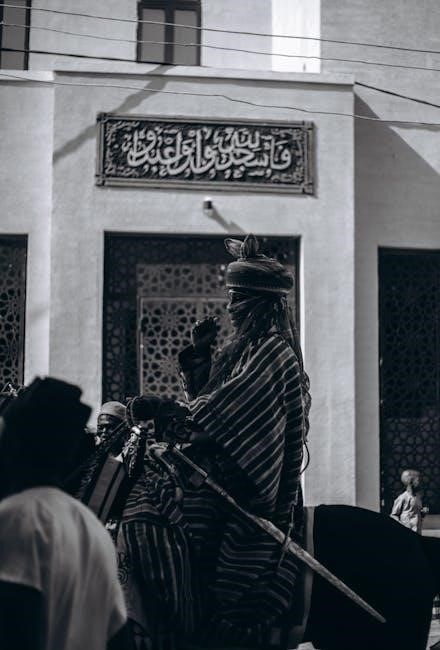This guide provides a comprehensive approach to learning Arabic in Bangladesh, focusing on Modern Standard Arabic and spoken dialects with Bangla support for easy understanding.
Overview of the Importance of Arabic Language in Bangladesh
The Arabic language holds significant cultural and religious importance in Bangladesh, particularly for understanding Quranic exegeses, Hadith, and classical Islamic literature. Many Bangladeshis pursue Arabic to deepen their religious knowledge and connect with Arab culture. Additionally, Arabic skills open doors to academic and career opportunities in fields like Islamic studies, international relations, and diplomacy. The language also bridges cultural gaps, fostering global communication and mutual understanding. As a result, learning Arabic is not only a spiritual enrichment but also a practical skill for personal and professional growth in Bangladesh.
Why Learn Arabic in Bangladesh?
Learning Arabic in Bangladesh offers numerous benefits, including enhanced understanding of Islamic texts like the Quran and Hadith. It fosters cultural exchange and bridges gaps with Arab nations, promoting global communication. Arabic skills also open career opportunities in Islamic studies, diplomacy, and international relations. With institutions like Shield Language Academy and the University of Dhaka offering tailored courses, learners can easily access resources. Additionally, Arabic proficiency enriches personal growth and academic pursuits, making it a valuable skill for both spiritual and professional development in Bangladesh.

Key Features of a Comprehensive Bangladesh Arabic Guide PDF
A well-structured guide includes Modern Standard Arabic, spoken dialects, Bangla support, essential phrases, vocabulary, and cultural insights, ensuring a holistic learning experience for beginners in Bangladesh.
Structure and Content of an Ideal Arabic Learning Guide
An ideal Arabic learning guide should be structured to balance theory and practice, starting with the basics of Modern Standard Arabic and gradually introducing spoken dialects. It should include clear grammar explanations, essential vocabulary lists, and daily conversation phrases. Cultural insights and Quranic connections are vital for learners in Bangladesh. The guide should offer exercises, quizzes, and audio resources for pronunciation practice. Lessons should be segregated into levels, such as A1 and A2, ensuring a systematic progression. Including Bangla translations and supplementary materials like PDF books enhances understanding and accessibility for local learners.
Importance of Including Bangla Support for Easy Understanding
Incorporating Bangla support in an Arabic learning guide is essential for Bangladeshi learners, as it bridges the gap between their native language and Arabic. This dual-language approach simplifies complex grammar, vocabulary, and pronunciation, making the learning process more accessible. Bangla explanations help learners grasp Arabic concepts quickly, reducing barriers and enhancing retention. Additionally, cultural connections and Quranic references are better understood with Bangla support, ensuring a deeper engagement with the language and its significance in Islamic studies. This feature makes the guide inclusive and effective for learners at all levels in Bangladesh.
Role of Modern Standard Arabic vs. Spoken Arabic
Modern Standard Arabic (MSA) is the formal, standardized version used in writing, media, and formal situations, while spoken Arabic varies across regions. In Bangladesh, learning MSA is crucial for understanding Quranic texts, academic materials, and formal communications. Spoken Arabic, however, is essential for real-life conversations and cultural immersion. Balancing both ensures learners can engage with religious texts, formal documents, and everyday interactions. This dual approach helps Bangladeshis connect with Arabic’s global relevance while mastering practical communication skills, making it a vital component of any comprehensive Arabic learning guide.
Best Institutions in Dhaka for Arabic Language Courses
Shield Language Academy and the University of Dhaka are top institutions offering Arabic courses tailored for Bangladeshi learners, providing Modern Standard Arabic and cultural insights with Bangla support.
Shield Language Academy: A Leading Center for Arabic Learning
Shield Language Academy stands out as a premier institution for Arabic learning in Dhaka, offering comprehensive courses tailored to Bangladeshi learners. The academy specializes in Modern Standard Arabic and spoken dialects, with Bangla support for easy comprehension. Courses are structured from A1 to A2 levels, ensuring a gradual and effective learning process. Learners benefit from free PDF materials, interactive classes, and experienced instructors. The academy’s focus on cultural insights and practical communication skills makes it a top choice for those seeking to master Arabic in Bangladesh.
University of Dhaka: Resources for Non-Arabic Speaking Students
The University of Dhaka offers specialized resources for non-Arabic speaking students, enabling them to master Arabic effectively. The institution provides structured courses designed for global learners, focusing on both Modern Standard Arabic and classical language skills. Over 70 years, the program has empowered students to engage in advanced studies, including Quranic exegeses, hadith, and classical Arabic literature. With experienced faculty and comprehensive materials, the university ensures learners gain proficiency in Arabic, catering to their academic and cultural enrichment needs in Bangladesh and beyond.
Other Prominent Language Schools in Dhaka
Besides Shield Language Academy, Dhaka is home to several other reputable institutions offering Arabic language courses. These schools provide structured learning pathways, often incorporating Bangla support for better comprehension. Many of these institutions cater to both beginners and advanced learners, offering resources like free PDF materials and access to platforms such as ArabicPod101 for supplementary learning. With experienced faculty and a focus on practical communication, these schools play a vital role in making Arabic language education accessible and effective for learners in Bangladesh.

Downloading and Using Free Arabic Learning Resources
Free Arabic learning resources, including PDF books and materials, are widely available online. Leading centers like Shield Language Academy offer these resources, enabling learners to access Modern Standard Arabic and spoken dialects with Bangla support. These materials are designed to facilitate easy understanding and practical application, helping learners connect with Arabic culture and knowledge effectively.
Where to Find Free Arabic PDF Books and Materials
Free Arabic PDF books and materials can be found through reputable institutions like Shield Language Academy and the University of Dhaka. These resources cater to non-Arabic speakers, offering Modern Standard Arabic and spoken dialects with Bangla support. Popular materials include vocabulary banks, cultural insights, and guides for understanding Quranic texts. Websites like ArabicPod101 also provide free PDF lessons covering essential topics. These resources are designed to facilitate easy learning, ensuring learners in Bangladesh can access high-quality materials for their Arabic language journey.
How to Utilize ArabicPod101.com for Supplementary Learning
ArabicPod101.com offers a wealth of free resources to complement Arabic learning in Bangladesh. With over 30 conversation PDFs covering topics like family, hobbies, and travel, learners can enhance their skills. The platform provides audio and video content, making lessons engaging and accessible. Bangladeshi learners can use these materials alongside the Madinah Book for a well-rounded understanding. The PDFs are user-friendly, catering to different proficiency levels, and are ideal for those seeking supplementary learning tools. This resource is particularly useful for reinforcing vocabulary and conversational skills.
Benefits of Using Madinah Book 1 for Quranic Understanding
Madinah Book 1 is highly recommended for Bangladeshis learning Arabic to understand the Quran and Hadith. It provides a strong foundation in Arabic grammar and vocabulary, essential for Quranic exegesis. The book aligns with Islamic scholarly pursuits, such as fiqh, sirah, and classical literature. Its structured approach makes complex concepts accessible, especially for non-Arabic speakers. Available in PDF format, it is ideal for self-study and supplementary learning, connecting learners with a vibrant culture and Islamic heritage. This resource is invaluable for those seeking to deepen their understanding of Quranic Arabic.

Common Arabic Phrases and Vocabulary for Beginners
Learn essential Arabic phrases like “Marhabaan” (hello), “Shukran” (thank you), and “Sabah al-khayr” (good morning). Build a strong vocabulary with Arabic-Bangla translations for daily communication and cultural insights.
Essential Phrases for Daily Communication
Mastering essential Arabic phrases is crucial for daily interactions. Start with common greetings like مرحباً (Marhabaan) for “hello” and صباح الخير (Sabah al-khayr) for “good morning.” Express gratitude with شكراً (Shukran) meaning “thank you.” Learn polite expressions such as من فضلك (Min Fadlak) for “please” and عفوًا (Afuwan) for “excuse me.” These phrases, often supported by Bangla translations, help learners connect with Arab culture and communicate effectively in basic situations. They form the foundation for further language exploration and cultural exchange.
Arabic-Bangla Vocabulary Bank for Beginners
A well-organized Arabic-Bangla vocabulary bank is essential for beginners. It provides side-by-side translations, making learning easier for Bangladeshi learners. Resources like the Madinah Book 1 and ArabicPod101 offer curated lists of common words and phrases, such as greetings, family terms, and everyday items. These vocabulary banks are often categorized by themes like food, numbers, and travel, ensuring systematic learning. By mastering these basics, learners can build a strong foundation in Arabic while connecting with its cultural context through Bangla explanations, fostering a deeper understanding and appreciation of the language.
Understanding the Definite Article in Arabic
The definite article in Arabic is “ال-” (al-), a prefix added to nouns to indicate specificity. Unlike English, it is not translated as “the” but is an integral part of the noun. For example, “الكتاب” (al-kitāb) means “the book.” In Bangla-supported resources, this concept is simplified for learners. Shield Language Academy and Madinah Book 1 provide clear explanations, while ArabicPod101 offers practical examples. Mastering “ال-” is crucial, as it appears in most Arabic sentences and is essential for accurate communication, helping learners avoid common mistakes in noun identification and sentence structure.
Cultural Insights and Their Importance in Learning Arabic
Cultural insights deepen Arabic learning by connecting language to traditions, values, and history. Understanding these elements enhances comprehension of literary works, religious texts, and daily interactions, making it invaluable for learners in Bangladesh.
Connecting with Arab Culture Through Language
Learning Arabic in Bangladesh opens a gateway to understanding Arab culture, traditions, and values. Language serves as a bridge to explore rich literary works, historical contexts, and Islamic studies. By mastering Arabic, learners can engage deeply with Quranic exegeses, hadith, and classical texts, fostering a stronger connection to the cultural heritage. This cultural insight enhances not only language proficiency but also appreciation for the traditions and history of the Arab world, making it a valuable component of the learning journey for students in Bangladesh.
Understanding Quranic Exegeses, Hadith, and Classical Literature
Mastering Arabic is essential for engaging with Quranic exegeses, hadith, and classical literature, which are central to Islamic studies. In Bangladesh, learners can access resources like Madinah Book 1, designed to aid Quranic understanding. Institutions such as the University of Dhaka provide courses tailored for non-Arabic speakers, enabling students to delve into scholarly pursuits like fiqh, sirah, and classical Arabic literature. This proficiency not only enhances religious knowledge but also fosters a deeper connection to Islamic heritage and cultural traditions, making it a vital aspect of Arabic learning in Bangladesh.
Engaging with the History and Modern Arabic Literature
Exploring Arabic literature, both historical and modern, enriches learners in Bangladesh by connecting them to a rich cultural legacy. From classical poets like Al-Khansa to contemporary writers, understanding literary works provides insights into Arab culture and language nuances. Resources like free PDF guides and courses at institutions such as the University of Dhaka facilitate access to these texts. Engaging with this literature not only enhances language proficiency but also fosters a deeper appreciation of the cultural and historical context, making it a valuable complement to Arabic learning in Bangladesh.

Step-by-Step Guide to Learning Arabic in Bangladesh
- Set realistic goals for language acquisition.
- Select appropriate resources like PDF guides and courses.
- Establish a predictable study schedule.
- Practice speaking and listening regularly.
- Review and adjust your learning plan periodically.
Setting Realistic Goals for Language Acquisition
Setting realistic goals is essential for effective Arabic learning in Bangladesh. Start with basic objectives like mastering the alphabet, common phrases, and simple grammar. Align goals with your purpose, such as understanding the Quran or conversing in daily situations. Break tasks into manageable steps, focusing on consistent progress rather than perfection. Use resources like Madinah Book 1 or ArabicPod101.com to track your advancement. Regularly review and adjust your targets to stay motivated and ensure steady improvement in your Arabic language skills.
Creating a Predictable Study Schedule
Establishing a consistent study routine is crucial for mastering Arabic. Allocate specific times daily for different activities, such as vocabulary on Mondays, grammar on Tuesdays, listening on Wednesdays, speaking on Thursdays, reading on Fridays, writing on Saturdays, and review on Sundays. Utilize resources like Madinah Book 1 for grammar and vocabulary, and ArabicPod101.com for listening exercises. Set aside 30 minutes in the morning and evening for dedicated study. Ensure flexibility to adapt to changes while maintaining consistency. Regularly review progress every two weeks to assess and adjust focus areas. Stay committed to the schedule to achieve steady improvement in Arabic proficiency.
Practicing Simple Questions and Answers in Arabic
Mastering basic Arabic conversations begins with practicing simple questions and answers. Start with common phrases like “How are you?” (كيف الحال؟) and “What is your name?” (ما اسمك؟). Use resources like ArabicPod101.com for conversation PDFs covering family, hobbies, and travel. Flashcards with Arabic-Bangla translations can aid memorization. Engage in daily practice, even for 10-15 minutes, to build confidence. Focus on spoken Arabic for practical communication while gradually understanding Quranic concepts. Regular practice enhances fluency and prepares learners for real-life interactions in Arabic.

Popular Arabic PDF Guides and Their Features
Discover premium Arabic PDF guides offering Modern Standard Arabic, spoken dialects, and Bangla support. Features include A1-A2 levels, free downloads, and supplementary materials for comprehensive learning.
Arabic Language Course in Dhaka: A Detailed Guide
Shield Language Academy offers a comprehensive Arabic course in Dhaka, blending Modern Standard Arabic and spoken dialects. The curriculum is tailored with Bangla support, catering to A1-A2 levels. Free PDF materials and flexible online/offline classes enhance learning. The guide emphasizes practical skills, such as asking and answering questions, and mastering the definite article. This structured approach ensures learners gain proficiency while connecting with Arab culture and literature, making it an ideal resource for Bangladeshi students seeking to understand Quranic texts and classical Arabic.
Free Arabic Class Resources in PDF Format
Access a variety of free Arabic learning resources in PDF format, designed to simplify language acquisition. Shield Language Academy offers complimentary PDF books tailored for Bangladeshi learners, focusing on Modern Standard Arabic and spoken dialects. Additionally, platforms like ArabicPod101 provide over 30 free PDF lessons covering essential topics such as family, travel, and hobbies. These resources are ideal for beginners, offering clear explanations and practical exercises. They also include cultural insights, helping learners connect with Arab traditions and literature while mastering the language.
Using University Guidelines for Non-Arabic Speakers
Universities in Bangladesh provide tailored guidelines and resources for non-Arabic speakers, enabling them to grasp the language effectively. The University of Dhaka offers structured materials, catering to students worldwide, to enhance proficiency in Modern Standard Arabic. These resources are designed to facilitate understanding of Quranic exegeses, hadith, and classical literature. With over 100 language learning books available, learners can access comprehensive guides, including Madinah Book 1, which is highly recommended for Quranic understanding. These university guidelines ensure a smooth transition into the world of Arabic, blending academic rigor with cultural insights.

Overcoming Challenges in Learning Arabic
Learning Arabic in Bangladesh involves overcoming challenges like complex grammar and dialect differences. Institutions like Shield Language Academy and the University of Dhaka provide tailored support to help learners succeed.
Common Difficulties Faced by Bangladeshi Learners
Bangladeshi learners often face challenges such as complex Arabic grammar, unfamiliar script, and dialect differences. Many struggle with balancing studies and part-time jobs, limiting practice time. Cultural and religious motivations drive interest, but consistent practice remains difficult. Shield Language Academy and the University of Dhaka offer tailored support, including Bangla explanations and free PDF resources, to help learners overcome these obstacles and achieve proficiency in Arabic.
Best Practices for Effective Language Learning
Effective Arabic learning in Bangladesh requires consistent practice and a structured approach. Set realistic goals and dedicate time daily to study. Utilize resources like free PDF guides and online platforms such as ArabicPod101.com for supplementary learning. Focus on understanding grammar, vocabulary, and pronunciation. Engage with native speakers or language partners to improve conversational skills. Regularly review and practice writing in Arabic script. Shield Language Academy and University of Dhaka offer tailored support to help learners stay motivated and progress steadily in their Arabic journey.
Role of Technology in Facilitating Arabic Learning
Technology plays a vital role in making Arabic learning accessible and efficient in Bangladesh. Online platforms like ArabicPod101.com offer free PDF materials and audio resources, enabling learners to study at their own pace. Language learning apps provide interactive lessons, quizzes, and pronunciation guides. Additionally, free Arabic PDF books and university guidelines cater to non-Arabic speakers, ensuring comprehensive understanding. These tools bridge the gap between traditional and modern methods, making Arabic learning convenient and engaging for Bangladeshi students.
This guide empowers learners in Bangladesh to master Arabic through structured resources, cultural insights, and practical tools, fostering a deeper connection with the language and its heritage.
Summarizing the Key Points of the Guide
This guide provides a structured approach to learning Arabic in Bangladesh, emphasizing Modern Standard Arabic and spoken dialects. It highlights the importance of Bangla support for easier comprehension and lists key institutions in Dhaka offering Arabic courses. The guide also recommends free PDF resources like Madinah Book 1 and ArabicPod101 for supplementary learning. Cultural insights and practical phrases are included to enhance understanding. By setting realistic goals and using technology, learners can overcome challenges and achieve proficiency in Arabic, connecting with its rich cultural and religious heritage effectively.
Encouraging Learners to Continue Their Arabic Journey
Mastering Arabic opens doors to understanding a rich culture, religious texts, and global communication. Learners in Bangladesh can benefit from structured courses, free PDF resources, and online tools like ArabicPod101. Setting realistic goals and staying consistent are key to progress. The growing importance of Arabic in education and diplomacy makes it a valuable skill. Stay motivated by celebrating small achievements and engaging with Arabic-speaking communities. With dedication, learners can overcome challenges and enjoy the rewards of Arabic proficiency, connecting with a vibrant culture and expanding their knowledge.
